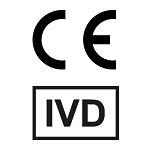Our IGH break apart probe is designed to detect IGH translocations. The probe comes labeled in orange and green, but can be customized to meet your needs.
** This product is for in vitro and research use only. This product is not intended for diagnostic use.
Gene Summary
Immunoglobulins recognize foreign antigens and initiate immune responses such as phagocytosis and the complement system. Each immunoglobulin molecule consists of two identical heavy chains and two identical light chains. This region represents the germline organization of the heavy chain locus. The locus includes V (variable), D (diversity), J (joining), and C (constant) segments. During B cell development, a recombination event at the DNA level joins a single D segment with a J segment; this partially rearranged D-J gene is then joined to a V segment. The rearranged V-D-J is then transcribed with the IGHM constant region; this transcript encodes a mu heavy chain. Later in development B cells generate V-D-J-Cmu-Cdelta pre-messenger RNA, which is alternatively spliced to encode either a mu or a delta heavy chain. Mature B cells in the lymph nodes undergo switch recombination, so that the V-D-J gene is brought in proximity to one of the IGHG, IGHA, or IGHE genes and each cell expresses either the gamma, alpha, or epsilon heavy chain. Recombination of many different V segments with several J segments provides a wide range of antigen recognition. Additional diversity is attained by junctional diversity, resulting from the random addition of nucleotides by terminal deoxynucleotidyltransferase, and by somatic hypermutation, which occurs during B cell maturation in the spleen and lymph nodes. Due to polymorphism, the numbers of functional V, J, and D genes differ among individuals and some V, D, J, and C segments may be pseudogenes. [provided by RefSeq, Dec 2017]
Gene Details
Gene Symbol: IGH
Gene Name: Immunoglobulin Heavy Locus
Chromosome: CHR14: 106879843-105586436
Locus: 14q32.33




